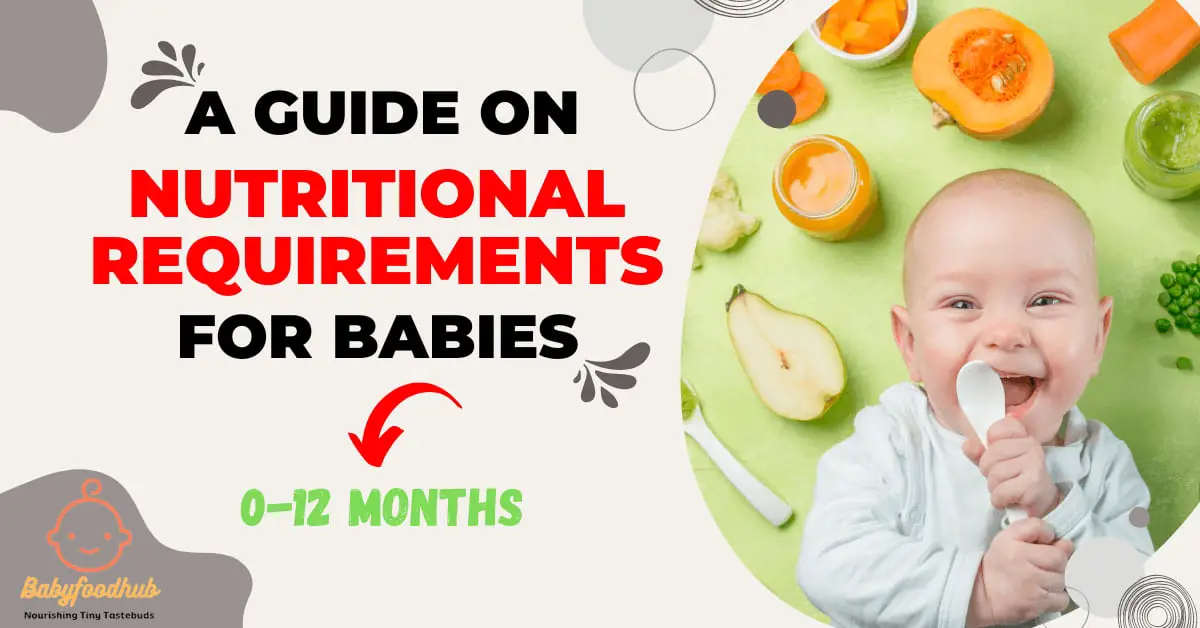Nutritional Requirements for Babies 0-12 Months

Babies 0-12 months require breast milk or formula for proper nutrition. Solid foods can be introduced gradually around six months of age.
Ensuring your baby’s nutritional needs are met is critical for their growth and development during the first year of life. From birth to 12 months, infants go through rapid growth and need specific nutrients to support their expanding physical and mental capabilities.
Exclusive breastfeeding is highly recommended for at least the first six months, providing a balance of nutrients, immune support, and bonding opportunities. If breastfeeding isn’t possible, iron-fortified infant formula is the next best option. Pediatricians typically advise introducing solid foods at about six months, starting with iron-rich purees and progressively moving towards a variety of flavors and textures. Close monitoring and guidance from a healthcare professional can help navigate this pivotal dietary transition, ensuring your baby thrives from their very first spoonful to their first birthday celebration.
Breastfeeding

Breastfeeding is the first step in providing your baby with a healthy start. It is a special time to bond with your little one. The right nutrition in the first year is vital for growth and development. Breast milk offers the perfect mix of vitamins, proteins, and fats. It is all your baby needs to thrive for the first six months.
Importance Of Breastfeeding
Breastfeeding has benefits for both the mother and the baby:
- Fights infections: It helps babies fight off viruses and bacteria.
- Reduces disease risk: It lowers the risk of asthma, allergies, ear infections, and SIDS (Sudden Infant Death Syndrome).
- Better health outcomes: Breastfed infants tend to have fewer hospital visits.
- Promotes weight gain: Helps premature babies catch up in growth.
- Bonding: Creates a close emotional bond between mother and baby.
Breast Milk Composition
Breast milk adapts to meet your baby’s needs. It changes as your baby grows. Your milk has three different stages:
- Colostrum: Rich in protein and antibodies, it is the first milk your body makes.
- Transitional milk: This comes after colostrum and has more fat and lactose.
- Mature milk: Arrives after the first two weeks, fully equipped to support your baby’s growth.
Each stage is designed to give your baby the precise nutrients they need.
| Component | Function |
| Antibodies | Fight disease and help the immune system |
| Fat | Brain growth and energy |
| Sugars and Milk Proteins | Easy digestion and nutrition balance |
Formula Feeding

Choosing the right nutrition for babies who aren’t breastfed is crucial. Formula feeding offers a balanced diet for infants from birth to 12 months. It ensures that babies who aren’t breastfed still receive all the necessary nutrients for healthy growth and development.
Types Of Infant Formula
Infant formulas come in different types, catering to the unique needs of babies.
- Cow’s milk-based formula: Most common and suitable for most infants.
- Soy-based formula: An alternative for babies with lactose intolerance or milk allergies.
- Hydrolyzed formula: For infants who have difficulty digesting regular formula.
- Specialized formula: Designed for preemies or those with specific medical conditions.
Feeding Schedule
A regular feeding schedule helps parents ensure their baby gets the right amount of nutrition.
| Age | Feeding Frequency | Amount per Feed |
| 0-1 Month | Every 2-3 hours | 1-2 ounces |
| 2-3 Months | Every 3-4 hours | 4-5 ounces |
| 4-5 Months | Every 4-5 hours | 5-6 ounces |
| 6-12 Months | Every 4-6 hours | 6-8 ounces |
Monitor your baby’s hunger cues and consult with a pediatrician for personalized advice.
Introducing Solid Foods

As your baby reaches milestones, exciting changes appear on the menu. Introducing solid foods is a thrilling phase for both parents and babies as it opens a new world of flavors and textures. This stage marks a significant step in your baby’s growth and development.
When To Start Solids
Most babies are ready to start solid foods around six months. Look for signs like your baby can sit upright and hold up their head. They should also be curious, watching you eat. Consult with your pediatrician for tailored advice.
Recommended First Foods
First foods should be easy on your baby’s tummy. Typical options include:
- Iron-fortified single-grain cereals like rice or oatmeal
- Pureed vegetables such as sweet potatoes and carrots
- Soft fruits like bananas, peaches, or avocados, either mashed or pureed
- Pureed meat for protein, such as chicken or turkey
Remember to mix cereals with breast milk or formula to a good consistency.
Introducing New Foods
Introduce new foods one at a time and watch for any reactions. Here’s how to proceed:
- Choose a time when your baby is not too tired or hungry.
- Offer one new food every three to five days.
- Look out for signs of allergies like rash, diarrhea, or vomiting.
Keep a diary of new foods introduced to track your baby’s preferences and any sensitivities.
Nutrients For Growth And Development

The first year of a baby’s life is a time of amazing growth and development. Essential nutrients are the building blocks that support this miraculous progress. Ensuring that your baby gets the right quantity and quality of nutrients is vital for their physical and cognitive development. Let’s explore the key nutrients required during these formative months.
Protein
Protein is fundamental for building a baby’s body tissues. It helps the brain develop and the immune system to fight infections. High-quality protein is found in breast milk and infant formula. Older infants may also get protein from:
- Pureed meats
- Mashed beans
- Softened cheese
Carbohydrates
Carbohydrates are a major energy source for your baby. Simple carbs are in breast milk and formula, while older babies can enjoy complex carbs through:
- Cereal
- Mashed fruits
- Soft vegetables
Fats
Fats are essential for a baby’s brain growth and energy. Healthy fats come from:
- Breast milk
- Infant formula
- Avocado
Omega-3 fatty acids, especially, are important and can be found in breast milk and some infant formulas.
Vitamins And Minerals
Vitamins and minerals support bone growth, vision, and organ function. Infants primarily get these from breast milk or formula. Starting around 6 months, doctors may recommend:
| Vitamin/Mineral | Food Sources |
| Iron | Infant cereal, pureed meats |
| Vitamin D | Fortified products, sunlight exposure |
| Calcium | Infant formula, breast milk |
Regular pediatric check-ups can help track your baby’s nutrient intake and growth milestones.
Allergies And Food Intolerances
The first year of a baby’s life is full of growth and discovery, including how the body reacts to different types of foods. Introducing solids to babies can sometimes trigger allergies or food intolerances. This important stage requires care and attention to safeguard your baby’s health.
Common Food Allergens
Babies can be sensitive to a variety of foods, and it’s essential to know which ones are common culprits.
- Milk – often an early allergen
- Eggs – particularly the whites
- Peanuts – a highly reactive legume
- Tree nuts – like almonds and cashews
- Wheat – gluten can be troublesome
- Soy – sometimes hidden in foods
- Fish and shellfish – often more severe
Recognizing Allergic Reactions
Spotting an allergic reaction quickly can prevent serious health issues. Look for signs like:
| Symptom | Description |
| Hives | Red, itchy welts on the skin |
| Swelling | Puffy face, eyelids, or other body parts |
| Gastrointestinal distress | Vomiting, diarrhea, or pain |
| Difficulty breathing | Wheezing, coughing, or shortness of breath |
| Cyanosis | Blue skin, signaling lack of oxygen |
Act fast if you see these signs. Contact a doctor or seek emergency care immediately for help.
Feeding Challenges And Concerns

Understanding your baby’s nutritional needs proves crucial in ensuring their healthy growth and development. Yet, navigating meal times often brings a mix of feeding challenges and concerns. Parents may encounter anything from feeding difficulties to concerns about their baby being under or overweight. This section dives into common issues parents face and offers practical advice to manage these concerns effectively.
Feeding Difficulties
Babies can experience a range of feeding difficulties. Some common struggles include:
- Refusal to eat or drink
- Limited appetite or picky eating
- Difficulty sucking or chewing
- Digestive issues like gas or reflux
Tackle these difficulties by:
- Offering a variety of foods to encourage a balanced diet
- Creating a calm, distraction-free feeding environment
- Being patient and persistent with new textures and flavors
- Consulting with a pediatrician if problems persist
Underweight Or Overweight Babies
Weight concerns, whether underweight or overweight, need careful attention. Tips for managing weight include:
| Concern | Action |
| Underweight Babies | Ensure calorie-rich, nutritious feedings; consult a pediatrician. |
| Overweight Babies | Focus on balanced nutrition; avoid overfeeding; seek professional advice. |
Monitor your baby’s growth pattern and discuss any significant fluctuations with your pediatrician. Remember, growth rates vary and each baby is unique.
Hydration
Proper hydration is crucial for healthy development in infants. While breastmilk or formula provides ample hydration for the first six months, as babies grow, their hydration needs evolve. Providing sufficient water becomes paramount, especially after starting solids. Recognizing the importance of water and the signs of dehydration helps ensure your baby stays hydrated, supporting their overall health and wellness.
Importance Of Water
Water plays a vital role in a baby’s health. It aids in digestion, helps regulate body temperature, and is essential for proper kidney function. As solid foods enter an infant’s diet, water becomes necessary to help process these new foods. An adequate amount of water also prevents constipation and helps maintain a balanced electrolyte level, crucial for babies’ growth and development.
Signs Of Dehydration
Dehydration can be a serious concern in infants. Parents and caregivers should watch for signs such as:
- Fewer wet diapers (less than six in 24 hours)
- Dry mouth or tongue
- Sunken soft spot on the head
- Fussiness or irritability
- Sunken eyes or cheeks
- No tears when crying
- Lethargy or drowsiness
Addressing these symptoms promptly with appropriate hydration is crucial. Consult a pediatrician immediately if dehydration signs persist or worsen.
Consulting Healthcare Professionals

Every baby’s nutritional needs are unique, and healthcare professionals play a crucial role. They offer tailored advice. This ensures babies grow healthy and strong. From the very first day, pediatricians and dietitians become key partners in your baby’s nutrition journey.
When To Consult A Pediatrician Or Dietitian
Parents should seek professional guidance right from the start. Key moments to consult include:
- Initial check-ups soon after birth
- When planning to introduce solids
- If the baby shows signs of allergies or intolerances
- When facing feeding challenges
- For advice on supplements or vitamins
Monitoring Baby’s Growth And Nutritional Health
Tracking growth is crucial in the first year. Here’s what to monitor:
| Age Range | Growth Indicators | Action |
| 0-4 Months | Weight, length, head circumference | Regular pediatric visits |
| 4-6 Months | Developmental milestones | Discuss the introduction of solids |
| 6-12 Months | Variety in diet, reaction to new foods | Ensure balanced nutrition |
Regular check-ups are essential to ensure proper growth. A pediatrician or dietitian assesses this growth. They also guide to overcoming hurdles in a baby’s diet. Always keep an open line with your healthcare team. This ensures early detection and resolution of potential issues.
Frequently Asked Questions On Nutritional Requirements For Babies 0-12 Months
What Are The Nutritional Requirements For A Baby?
Babies need a balance of nutrients including protein, fats, carbohydrates, vitamins, and minerals. Breast milk or formula provides the required nutrition for infants, while older babies gradually introduce age-appropriate solids alongside milk. Regular pediatric visits ensure their growth and nutritional needs are met.
What Are The Nutritional Recommendations For Infants?
For infants, breast milk or formula is essential for the first six months. Introduce solid foods around six months alongside milk. Offer a variety of foods, including fruits, vegetables, and iron-rich items. Avoid added sugars and honey. Prioritize hydration with breast milk, formula, or water.
What Nutrients Do 0 To 6 Months Need?
Babies from 0 to 6 months primarily need breast milk or formula, providing essential nutrients, vitamins, and antibodies.
What Are The Nutritional Requirements For A 6 12 Month Old?
Babies aged 6-12 months require a diet of breast milk or formula, pureed fruits and veggies, small amounts of protein, and iron-fortified cereal. They should also start practicing with a cup and water.
What Do Newborns Need Nutritionally?
Newborns require breast milk or formula to provide essential nutrients, proteins, fat, carbohydrates, and vitamins necessary for growth and development.
Conclusion
Ensuring your baby receives proper nutrition is critical for development. As every stage from 0-12 months presents unique dietary needs, it’s essential to adapt. Seek guidance from healthcare professionals, and always prioritize quality feeding moments. With attentiveness and love, you’ll nurture your child’s growth optimally.
Remember, the right start leads to a healthier future.






